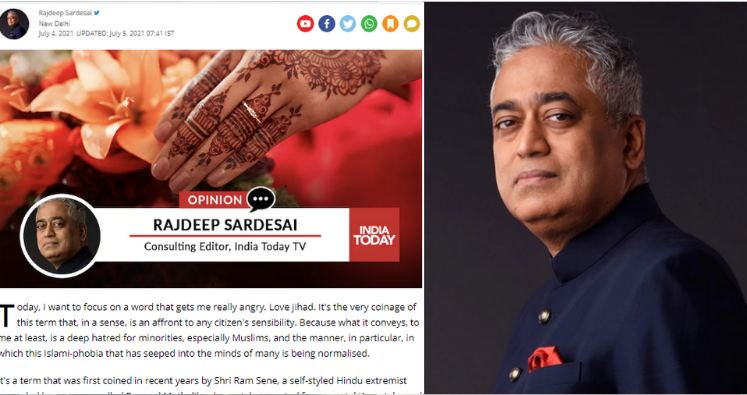Alleged journalist and India Today anchor Rajdeep Sardesai recently showered his praises for the heinous practice of ‘love jihad’ in the country. While many state governments continue to fight the menace of love jihad, the journalist tried to whitewash the practice in his opinion piece on India Today’s website, titled, ‘Love Jihad: Celebrate love, don’t criminalise it.’
In the article, Sardesai blatantly exposed his love for the practice that has become a widespread mess in India in recent years. He wrote, “Today, I want to focus on a word that gets me really angry: Love jihad. It’s the very coinage of this term that, in a sense, is an affront to any citizen’s sensibility.” This proves how Sardesai wants to whitewash and manipulate the havoc which is wreaking the society and that he doesn’t seem to understand the very difference between ‘love’ and ‘love jihad’.
Thousands of Hindu women are targeted and blackmailed into conversion every year but for Sardesai, it is “a deep hatred for minorities, especially Muslims”. He surely seems to be agreeing with the liberals who call it a figment of imagination. However, if love jihad was indeed a figment of imagination then the southern states, supposedly the most literate and educated in India, would not have sounded the bugle on the menace. As reported by TFI, Kerala’s biggest Church, the Syro-Malabar Church had raised the alarms last year by claiming that Christian girls were being targeted and killed in the name of love jihad.
With the coming of the BJP into power at the centre, stricter laws are being implemented in the country to keep the menace of love jihad under check. Even the UP government has implemented the ‘Prohibition of Unlawful Religious Conversion Bill, 2021’, commonly known as the ‘love jihad’ law, formalising the legislation by a voice vote. Under the law, a person if convicted of carrying out forceful conversions for the sake of marriage, he shall face imprisonment of 1-5 years, and the crime is a non-bailable offence.
UP is not the only state to take the legislation route to end forceful conversions. In January, even the Madhya Pradesh government passed the Freedom of Religion Ordinance, 2020, and promulgated it into a law. In MP, according to the law, forceful conversion of a minor, woman, or a person from Scheduled Caste or Scheduled Tribe, would draw a minimum jail term of 2-10 years, along with a minimum penalty of Rs 50,000. However, the efforts taken by both states to tackle the malpractice is “a great way to play vote-bank politics and divide communities on the grounds of religion,” according to Sardesai.
Particularly targeting the Yogi Adityanath government, Sardesai added, “When the Uttar Pradesh government last year brought in a law that effectively banned these kinds of interfaith marriages by terming them love jihad, suggesting that they were being done as a ruse for conversion. And the entire structure of the law was, to my mind, clearly against criminal jurisprudence because it seemed to suggest that the onus was on the couple to prove that they had not got married under duress or coercion.”
Even commenting on the recent abduction and forceful conversion of two Sikh girls in J&K, Sardesai took to question the subsequent action taken in the case. He said, “Both these girls, in a way, have become victims of a strident campaign that’s been carried out. One of them was forcibly taken away, her marriage annulled, married off to a Sikh boy, and brought to Delhi. The other girl is in hiding. One of the boys has been arrested. No one knows why.”
Despite the fact that the love jihad menace is a terrible offence, Sardesai glorifying and celebrating the forceful conversion instead of criminalising it, speaks of the low that any journalist can stoop to propagate the agenda of the Islamists. However, this is not the first time that Rajdeep Sardesai has come in the spotlight for his comments on a sensitive issue.
Back in January, on the Republic Day, Sardesai yet again had gone on to allege that the farmer who died during the violence at ITO was, in fact, shot dead by the Delhi Police – an unsubstantiated claim made with no evidence to back it, propounded by the very people who were causing anarchy to spill onto the streets of Delhi in the first place.
As reported extensively by TFI, India Today had taken Sardesai off the air for two weeks after his misreporting on a violent agitator’s death during the tractor rally. Further, the alleged journalist had also been stripped off his salary for one month. This proves to what extent a journalist can use the media to manipulate the masses. Strict measures should be taken against such serial propagandists from peddling fake news and engaging in virtue signalling.
